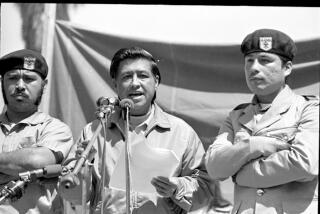Block Decision in Citrus Case Is Overturned
- Share via
Former U.S. Agriculture Secretary John R. Block caved in to political pressures from Sunkist Growers and conducted an illegal referendum in 1984 on “marketing orders” for navel and valencia oranges, a federal administrative law judge ruled.
The ruling issued by Agriculture Department Administrative Law Judge Victor Palmer nullifies Block’s decision on a referendum by citrus growers on the marketing orders, but a USDA spokesman said the ruling would have no practical impact on citrus growers or consumers.
Intense Lobbying
Palmer’s decision, issued last Friday, said testimony showed officials of Sherman Oaks-based Sunkist, a co-operative of 6,000 growers in California and Arizona, pressured Block to change his mind about how the referendum would be conducted. Block, weary from the intense lobbying, finally did so after receiving a telephone call from the Sunkist president, testimony contended.
Oranges and some other agricultural products are subject to marketing orders that regulate the flow of fresh fruit to be marketed week by week to avoid gluts and shortages and to stabilize prices. The orders are subject to periodic amendments and votes by growers, and in 1984, 21 amendments to the navel and valencia orange rules were up for vote.
Block had decided that the amendments should be voted on as a package rather than individually, as was the tradition. If the amendments failed, then the 50-year-old marketing orders also would be invalidated. But Block changed his mind on the procedure after about six weeks.
‘Wide Discretion’
J. Patrick Boyle, administrator of the Agriculture Department’s agricultural marketing service, which oversees the marketing rules, said the department plans to appeal the ruling to the USDA justice officer.
“The department believes that the secretary has a wide amount of discretion in the area of establishing procedures,” Boyle said.
Boyle noted that the judge did not go so far as to rule that the resulting amended marketing orders were invalid. As a result, there is no practical effect on the industry, he said.
Sunkist officials were said to be traveling and unavailable for comment Thursday.
Palmer said he believed Sunkist pressed Block to conduct the referendum according to its wishes because the cooperative feared that the voting procedure Block originally wanted to use would jeopardize its dominant position in the industry.
More to Read
Sign up for Essential California
The most important California stories and recommendations in your inbox every morning.
You may occasionally receive promotional content from the Los Angeles Times.













